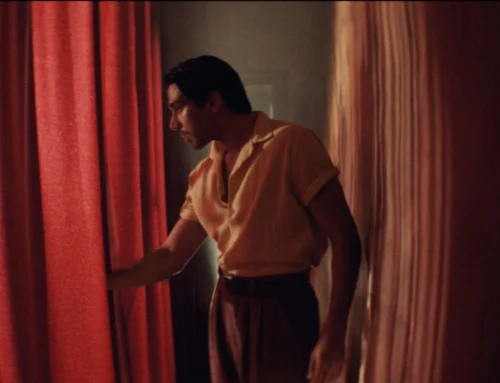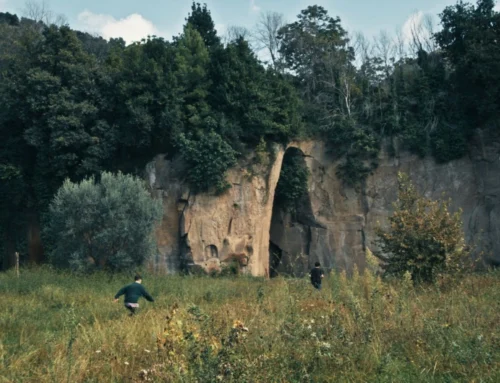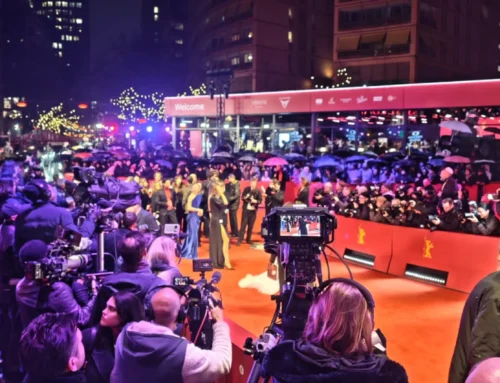Langreview Kurzkritik English Version Fakten + Credits
In 2015, directors Sven Unterwaldt, Erik Haffner and Tobi Baumann began a new exciting journey in collaboration with scriptwriter Chris Geletneky. Together they developed the comedy series SKETCH HISTORY for ZDF, which within four years comprised a whole 30 episodes with a running time of around 25 minutes in three seasons. The concept was as simple as it was ingenious. Essential historical events were rewound in short sequences and provided with humorous elements. Accordingly, many events are based on true events, but are massively distorted and often anachronistically linked to modern world views. For this, the series received the award for Best Sketch Show at the German Comedy Awards in three consecutive years. At the same time, however, there was also much criticism with the tenor that the humour was forced onto the sequences and that they were therefore far removed from good entertainment.
That’s what it’s all about
Finally, the time has come. Voyager, which began its journey in 1977, has been discovered by alien life and with it the legendary Golden Record, a record on which important elements of human achievement are stored. However, when the aliens begin to read it out, they are shocked to discover what primitive people populate the Earth. In 15 short stories they have to watch how stupidity and idiocy always prevail and how Homo sapiens digs his own grave. Dr. Gerhard Friedle takes the viewers of the record through the entire history of mankind, selecting the most important and greatest moments. In the process, amazing things come to light that even the rest of humanity has never seen before.
Review
Presumably for legal reasons, Chris Geletneky clearly points out that DIE GESCHICHTE DER MENSCHHEIT – LEICHT GEKÜRZT is not a continuation of the series SKETCH HISTORY, which was discontinued by ZDF in 2019 for unknown reasons, nor are they involved in the production of the film. It goes on to say that each of the sequences will consist of the familiar ensemble cast and will feature a special guest star. In addition, for the first time there is an all-encompassing frame story that links the individual episodes and offers a concrete timeline. But if we are honest, the first episode already shows that all these details are just production-political silliness and there is no real demarcation between the series and the film, except that now it is not Bastian Pastewka as the omniscient narrator who connects the sketches, but Christoph Maria Herbst who takes over this job in a somewhat modified form.
So instead of creating a new imaginative comedy production, old ideas are revisited and restaged. From a technical perspective, we get a lot. Every sequence looks high-quality by German standards in terms of scenery. This is mainly due to the fact that many sequences were shot in the Bulgarian Nu Boyana Studios, which already provided some elaborate film sets. This made it possible to recreate locations with extensive attention to detail, creating a great visual experience that is also reflected in the versatile costumes. Two specially composed songs provide the only background music. Both are primarily content-driven and are intended to put history in a critical light.
Smile and wave, men
Ultimately, however, the technical aspect is only a feeder for the film as a whole. The strength of the script as well as the presentation of the actors is what decides the overall quality. DIE GESCHICHTE DER MENSCHHEIT – LEICHT GEKÜRZT offers us large parts of the German comedy elite, who can be seen in the most diverse roles. There is no clear core cast for the individual sketches and so the performers are mixed up wildly each time. Nevertheless, they often reflect roles from their own comedy programmes. For example, Alexander Schubert and Holger Stockhaus form the infamous Kasallek craft company and Max Giermann presents himself as Jesus in a Klaus Kinski version. The cast is supplemented by well-known performers such as Tom Schilling, Kostja Ullmann and Barbara Meier as well as the wonderful Hannes Jaenicke, who has not been seen on the big screen for several years now.
The unbelievable breadth of the criticism is also fundamentally praiseworthy. Religion, politics, society as well as science fall victim to the satirists and are pilloried in their entirety. In particular, the idiocy of people always doing the same thing and expecting different results is criticised just as much as fake news, discussions about equality, the diversity of people, language and communication as well as the power structure between rich and poor and educated and uneducated. Unfortunately, the discourse often starts at the wrong levers or is thrown over in favour of a gag. Not infrequently, moreover, the topics are touched on very superficially, lightly pointing out a problem without naming it more precisely or even suggesting sensible alternatives – it is, of course, easier to find fault than to discuss its solution.
The odyssey of flat gags
The real drama of this film, however, is that DIE GESCHICHTE DER MENSCHHEIT – LEICHT GEKÜRZT wants to be a comedy-satire production and lacks any humour. Satirical scenes parody, but cannot come up with a sophisticated punchline. Almost all the gags are based on anachronisms that underlie a serious topic and are ridiculed here. Not infrequently, scenarios are resolved rather clumsily and none of the jokes really comes as a surprise. At the latest, it is usually already recognisable from the performers in advance in which direction a sketch will develop. Of course, Vikings discussing complaints received of arson are nice to look at in some form, but the bite of this idea is gone after only a few seconds and doesn’t need a minute-long sequence that has nothing more to offer than this one gag. If then not even the outtakes are fun to watch, then a film has sadly missed its genre.
 Conclusion
Conclusion
DIE GESCHICHTE DER MENSCHHEIT – LEICHT GEKÜRZT comes along with great ambitions and lets us hope for silliness like in DER WIXXER or for historical parodies like Monty Python perfected. Instead, however, we have to be content with a loveless continuation of the show SKETCH HISTORY, which can offer neither bite nor fun and therefore plays completely past the audience. The only things worthy of praise are the technical realisation and the specially composed songs, which are unfortunately rare in today’s films. It cannot be ruled out that many social groups fighting for equality and attention might feel denigrated in their efforts, and rightly so.
How did you like the movie?










Hat sich mal irgendjemand den Abspann angesehen? Das ist der letzte Gag dieses Films – scheint aner niemandem aufzufallen.
Bin extra hierher gekommen um zu schauen ob es noch eine oder mehrere Szenen im Abspann gibt. Dann weiß ich jetzt Bescheid, dass sich sitzen bleiben später lohnt
Es gibt eine ganze Menge Outtakes, so das es im Grunde sowieso dazu kommt, das man sitzen bleibt :)